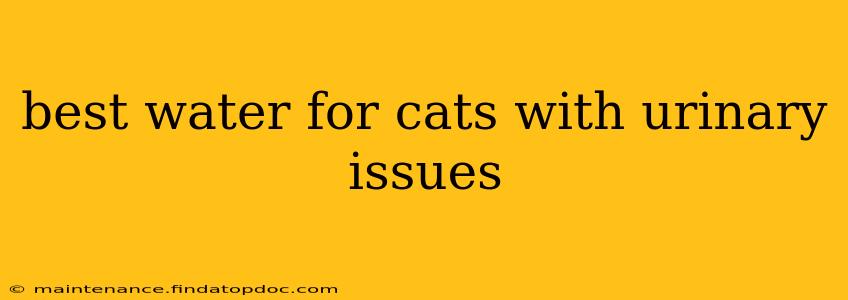Cats with urinary tract issues require special attention to their hydration, as proper fluid intake is crucial for flushing out urinary crystals and preventing further complications. While there isn't a single "best" water for all cats with urinary problems, choosing the right type and ensuring adequate consumption can significantly improve their health. This guide explores various water options and offers advice for encouraging your feline friend to drink more.
What Kind of Water is Best for Cats with Urinary Problems?
The ideal water for cats with urinary issues is clean, fresh, and free of contaminants. Avoid tap water containing high levels of minerals like magnesium, calcium, and phosphorus, which can contribute to the formation of urinary crystals. These minerals can be present in varying amounts depending on your location's water hardness.
While bottled spring water might seem like a good alternative, it’s crucial to check the mineral content. Some bottled waters are still high in minerals, potentially counteracting your efforts to support your cat's urinary health. Look for water low in total dissolved solids (TDS).
Filtered water is generally a safer option. A good quality water filter, such as those with carbon filtration or reverse osmosis, can effectively remove many harmful substances and reduce mineral content.
Should I Give My Cat Distilled Water?
Distilled water is purified water with almost all minerals removed. While it might seem like the perfect solution for preventing mineral buildup in the urinary tract, it lacks the essential electrolytes that cats need. Prolonged consumption of distilled water can actually lead to electrolyte imbalances, potentially causing more health problems. Therefore, distilled water is generally not recommended for long-term use.
What About Adding Water Enhancers?
Some cat owners add flavor enhancers to their cat's water to encourage drinking. While this can be a helpful strategy for increasing water intake, exercise caution. Avoid adding anything artificial or sugary. Small amounts of low-sodium chicken or tuna broth can sometimes be appealing, but always check the sodium content, as high sodium can exacerbate urinary problems.
How Can I Tell if My Cat is Drinking Enough Water?
Monitoring your cat's water intake is vital. Signs of dehydration include lethargy, dry gums, and decreased urination. If you're concerned about your cat's hydration levels, consult your veterinarian. They can provide guidance on the appropriate water intake for your cat based on its weight, age, and health condition.
My Cat Doesn't Drink Enough Water – What Can I Do?
Many cats are notoriously picky drinkers. If your cat isn't consuming enough water, try these strategies:
- Multiple water bowls: Place several bowls in different locations around your home.
- Fountains: Cat water fountains encourage drinking by providing moving water, which many cats find more appealing.
- Different bowl materials: Some cats prefer certain materials over others (e.g., stainless steel versus plastic). Experiment to find your cat's preference.
- Warm water: Some cats prefer slightly warmer water.
Can Certain Diets Affect My Cat's Need for Water?
Yes, absolutely. Your cat's diet plays a significant role in its hydration needs. Dry kibble has a lower water content than wet food. If your cat eats primarily dry food, you may need to focus on providing extra water to compensate. Consulting your veterinarian about your cat's diet and its impact on urinary health is important.
Is there a specific pH level of water that's ideal for cats with urinary issues?
The ideal urinary pH for cats is slightly acidic (around 6.0-6.5). While the pH of water itself plays a minor role, it's more important to focus on the overall urinary pH, which is influenced by diet and overall health. Your vet can perform a urinalysis to determine your cat's urinary pH and recommend appropriate dietary changes if needed. Don't try to adjust your cat's water pH without veterinary guidance.
Conclusion:
Providing your cat with clean, fresh, and low-mineral water is essential, especially if it suffers from urinary tract issues. While filtered water is generally recommended, avoid distilled water due to the risk of electrolyte imbalance. Always consult your veterinarian for personalized advice on the best water type and strategies for ensuring adequate hydration for your cat. Remember, consistent monitoring and proactive measures are key to managing your cat's urinary health.
